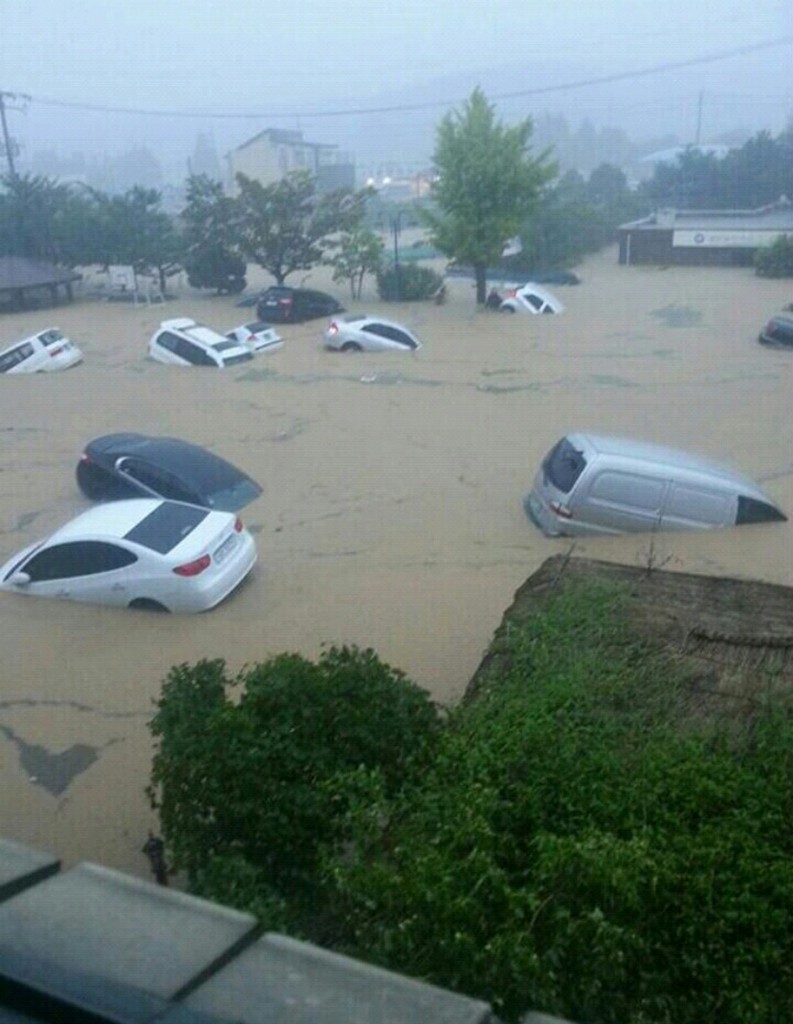- California Assembly OKs highest minimum wage in nation
- S. Korea unveils first graphic cigarette warnings
- US joins with South Korea, Japan in bid to deter North Korea
- LPGA golfer Chun In-gee finally back in action
- S. Korea won’t be top seed in final World Cup qualification round
- US men’s soccer misses 2nd straight Olympics
- US back on track in qualifying with 4-0 win over Guatemala
- High-intensity workout injuries spawn cottage industry
- CDC expands range of Zika mosquitoes into parts of Northeast
- Who knew? ‘The Walking Dead’ is helping families connect
Flash floods devastate Busan, Changwon
At least 5 people dead; Gori nuclear power plant shut down

Cars are afloat in a flooded area in Geumjeong, Busan, Monday. Heavy rain hit the southern part of the country, causing flash floods, landslides, and suspension of subway service in some areas. (Yonhap)
By Jung Min-ho
At least five people are dead and four are missing after heavy rainfall hammered Busan, Changwon and other southern parts of the country Monday.
Four women were killed in flash floods in Busan, while one woman was found dead in a public bus that had been swept into a flooded stream in Changwon.
The Changwon victim is believed to have been in her 30s or 40s. Police said at least five passengers had been aboard the bus, and that rescue operations were underway.
In Dongnae-gu, northern Busan, rescue workers found two women trapped in a submerged car. They were immediately taken to a hospital, but were later pronounced dead.
Another victim, 60, was found at 4 p.m. after apparently being crushed to death by a car.
In Gijang-gun, southern Busan, rescue workers found a dead woman in a car. According to the workers, she and two co-workers were on their way home from work when their car was caught in a flash flood. They worked at a nearby golf club. The two co-workers managed to escape.
According to the Korea Meteorological Administration, rain fell nearly 100 millimeters per hour in Changwon and 130 millimeters per hour in Busan at its heaviest point.
Police and fire officials said nonstop rain and fast-moving streams had hampered the rescue operation. They were working to assess the damage.
The massive rain also halted the operation of a nuclear reactor in Busan.
According to the Korea Hydro and Nuclear Power Co. (KHNP), the Gori-2 nuclear power plant was manually shut down at 3:54 p.m. because of the weather.
There were no signs of a radiation leak or of any immediate risk, the KHNP said.
It was the first time in history that a Korean nuclear reactor had been shut down because of rain.
The Gori-2 reactor has been in operation since July 1983.
“Because excessive water flowed into a building that takes in seawater to cool down turbine steam, we decided to manually halt the operation of the nuclear reactor for the safety of the electrical equipment,” the KHNP said.
Busan subway officials had to close 14 stops ― seven on Line No. 1 and seven on Line No. 2. Normal service has since resumed.
About 380 students were stranded at Yangduk Girls’ Middle School when the first floor was flooded, but they were later rescued.









![그룹 방탄소년단(BTS) [BTS 공식 트위터. 재판매 및 DB 금지]](http://www.koreatimesus.com/wp-content/uploads/2025/07/Untitled-5-copy-199x223.jpg)







Pingback: Busan Country Club | Taylormade @ Golf Clothes Shop
Pingback: Busan Golf Course | Play Golf Now
Pingback: Dongnae Country Club | Ultimate Golf Courses - The sweet spot
Pingback: Pusan Country Club | reservations - play golf
Pingback: Dongnae Country Club Busan | Best - Golf Club Review